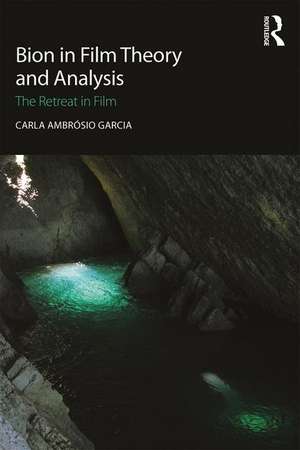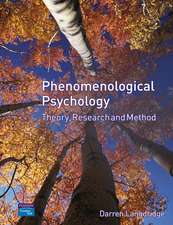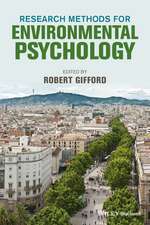Bion in Film Theory and Analysis: The Retreat in Film
Autor Carla Ambrósio Garciaen Limba Engleză Paperback – 23 noi 2016
Presented in two parts, the book seeks to deepen our understanding of the film experience and psychical growth. Part I places Bion’s view on the importance of the epistemophilic instinct at the heart of a critique of the pleasure-centred theories of the cinematic apparatus of Jean-Louis Baudry, Christian Metz and Gaylyn Studlar, proposing an idea of cinema as ‘thoughts in search of a thinker’. Garcia then moves from Bion’s epistemological period to his later work, which draws on mysticism, in order to posit an emotional experience in the cinema through which the subject can be or become real (or at one with ‘O’). Part II examines representations of retreat in four European films, directed by Ingmar Bergman, Pier Paolo Pasolini, Georges Perec and Bernard Queysanne, and Manoel de Oliveira, showing them to articulate a gesture of retreat as an emotionally turbulent transitional stage in the development of the psyche – what Bion conceptualizes as caesura.
Through its investigation of the retreat in cinema, the book challenges common understandings of retreat as a regressive movement by presenting it as a gesture and space that can also be future-oriented. Bion in Film Theory and Analysis will be of significant interest to academics and students of psychoanalysis, psychotherapy, and film and media studies, as well as psychoanalysts and psychotherapists.
| Toate formatele și edițiile | Preț | Express |
|---|---|---|
| Paperback (1) | 450.95 lei 6-8 săpt. | |
| Taylor & Francis – 23 noi 2016 | 450.95 lei 6-8 săpt. | |
| Hardback (1) | 1088.83 lei 6-8 săpt. | |
| Taylor & Francis – 23 noi 2016 | 1088.83 lei 6-8 săpt. |
Preț: 450.95 lei
Preț vechi: 474.68 lei
-5% Nou
Puncte Express: 676
Preț estimativ în valută:
86.30€ • 89.77$ • 71.25£
86.30€ • 89.77$ • 71.25£
Carte tipărită la comandă
Livrare economică 14-28 aprilie
Preluare comenzi: 021 569.72.76
Specificații
ISBN-13: 9781138193048
ISBN-10: 1138193046
Pagini: 184
Ilustrații: 10 black & white halftones
Dimensiuni: 156 x 234 x 13 mm
Greutate: 0.27 kg
Ediția:1
Editura: Taylor & Francis
Colecția Routledge
Locul publicării:Oxford, United Kingdom
ISBN-10: 1138193046
Pagini: 184
Ilustrații: 10 black & white halftones
Dimensiuni: 156 x 234 x 13 mm
Greutate: 0.27 kg
Ediția:1
Editura: Taylor & Francis
Colecția Routledge
Locul publicării:Oxford, United Kingdom
Public țintă
Postgraduate and ProfessionalCuprins
Introduction Part 1 – The Retreat in Cinema 1. Rethinking the Cinematic Apparatus with Bion's Theory of Thinking 2. Rethinking the Cinematic Apparatus with Bion’s Concept of O Part 2 - The Retreat in Fim 3. The Caesuras in Through a Glass Darkly 4. Caesura and Binocular Vision in Pigsty 5. The Caesura and the Images of the Point, the Line, and the Circle in A Man Asleep 6. The Caesura and the Compartments of the Internal Mother in The Convent Conclusion Index
Notă biografică
Carla Ambrósio Garcia is a filmmaker and academic who completed her doctorate in Film Studies at King’s College London (funded by Fundação Ciência e Tecnologia in Portugal). Her articles on film and psychoanalysis have been published in academic journals and edited collections, and she currently teaches at King’s College and Royal Holloway, University of London.
Recenzii
"Bion in Film Theory is that rare thing: a book that offers a renewed encounter between psychoanalysis and cinema. At once disciplined and productively wayward, this book opens up new ground for thinking about what we do when we use the environment created by a work of art: film, in this instance, but Garcia’s intervention has a reach well beyond her immediate concerns. In particular, through her explorations of Bion’s writings, the ‘retreat’ becomes a generative figure via which to reflect not only on what psychoanalysis can do to our understanding of the experience of film but, more broadly, the conditions of life and labour in the 21st century. At stake, in effect, is a question about the futures of human mind and being – and what cinema can contribute to our understanding of the forms of resistance made possible by retreat." - Prof. Vicky Lebeau, Professor of English, University of Sussex
"This is a sophisticated piece of original research at the intersection of psychoanalysis and film studies. Carla Ambrósio Garcia brilliantly demonstrates why film theory’s canonical accounts of spectatorial experience need to be revisited in the light of Wilfred Bion (and object-relations generally), and facilitates a productive thinking space for the ongoing discussion about how we might conceive of a revolutionary psychical metamorphosis in and through the experience of film." - Dr Andrew Asibong, Reader in Film and Cultural Studies, Birkbeck, University of London
"Carla Ambrósio Garcia’s fascinating book offers a new way of thinking about cinema, and its introduction of Bion to film studies ought to be both noticed and long lasting." - Dr Agnieszka Piotrowska, Filmmaker and Reader in Film Practice and Theory, University of Bedfordshire
"This is a sophisticated piece of original research at the intersection of psychoanalysis and film studies. Carla Ambrósio Garcia brilliantly demonstrates why film theory’s canonical accounts of spectatorial experience need to be revisited in the light of Wilfred Bion (and object-relations generally), and facilitates a productive thinking space for the ongoing discussion about how we might conceive of a revolutionary psychical metamorphosis in and through the experience of film." - Dr Andrew Asibong, Reader in Film and Cultural Studies, Birkbeck, University of London
"Carla Ambrósio Garcia’s fascinating book offers a new way of thinking about cinema, and its introduction of Bion to film studies ought to be both noticed and long lasting." - Dr Agnieszka Piotrowska, Filmmaker and Reader in Film Practice and Theory, University of Bedfordshire
Descriere
Advancing the field of psychoanalytic film studies, the author takes the concept of the retreat and examines how it has been used and what it represents, concluding with an overarching notion of this theme and how it connects with the development of the mind.













